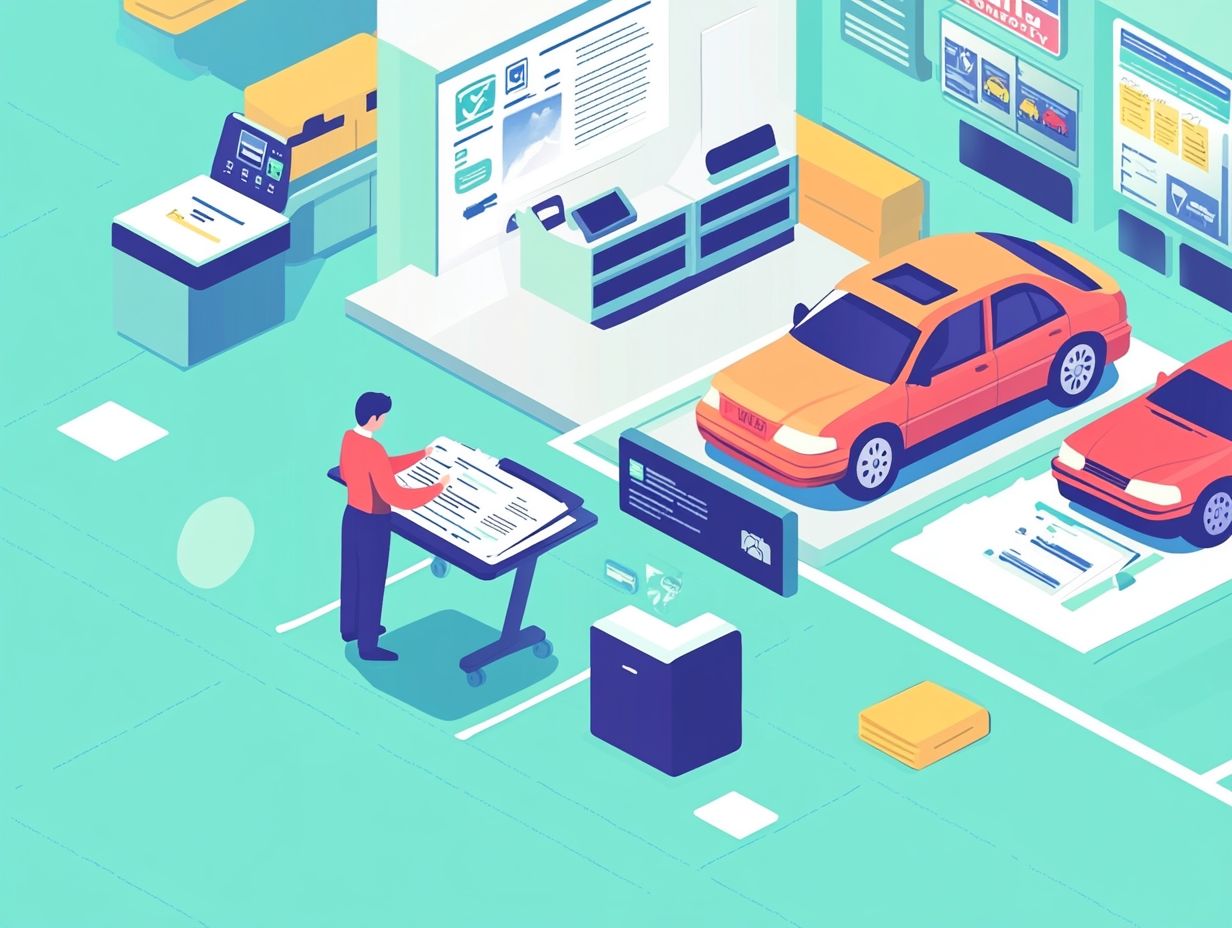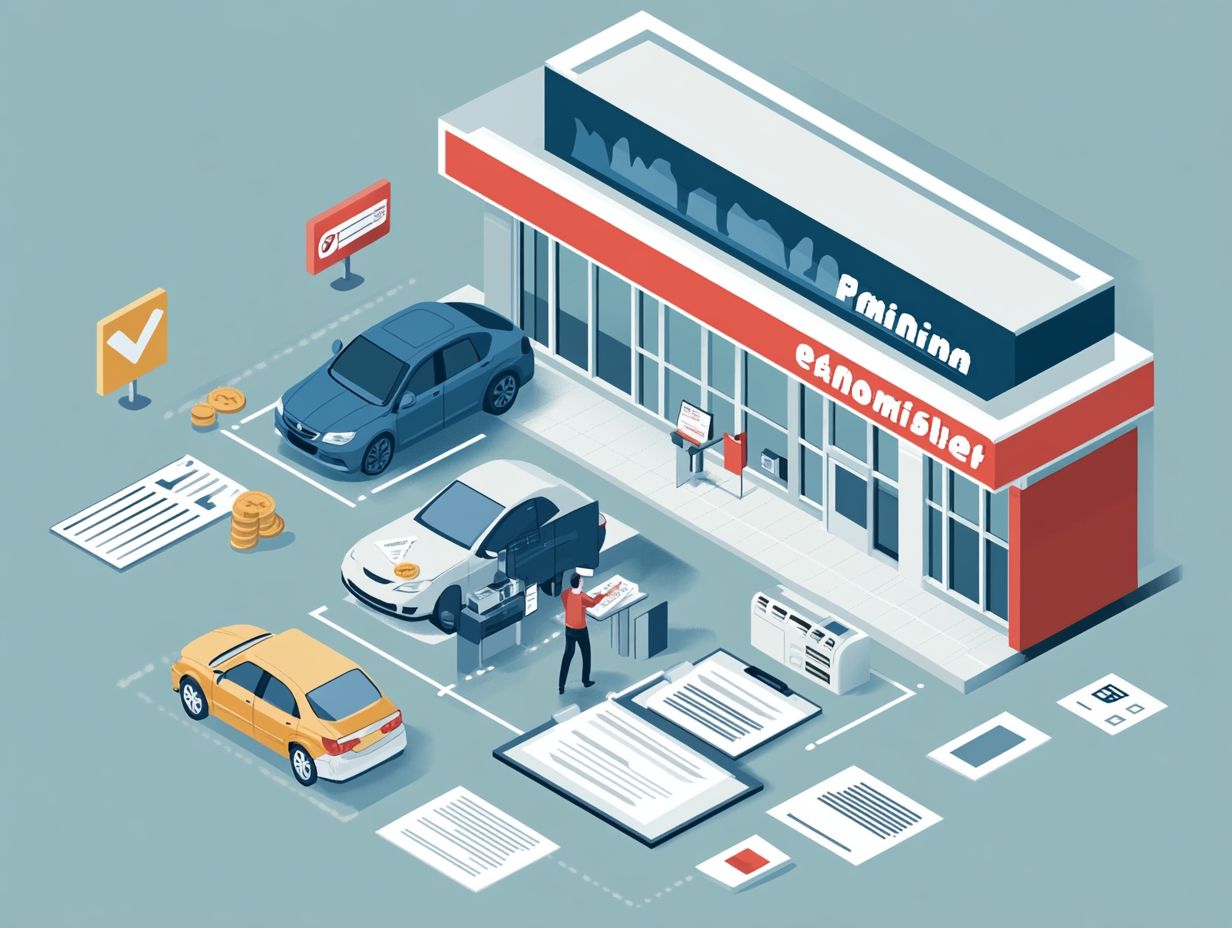5 Myths About Car Financing Debunked
When it comes to car financing, misconceptions are all too common, often steering potential buyers off course. You might think that a flawless credit score is a prerequisite for loan approval or that dealers consistently offer the most favorable financing deals.
This article sets the record straight by debunking five prevalent myths about car financing. You’ll gain essential insights to help you secure the best deal, from negotiating loan terms to exploring refinancing options.
Contents
- Key Takeaways:
- 1. You Need a Perfect Credit Score to Get Approved for a Car Loan
- 2. Dealers Always Offer the Best Financing Deals
- 3. You Can’t Negotiate the Terms of Your Car Loan
- 4. You Have to Put Down a Large Down Payment
- 5. You Can’t Refinance Your Car Loan
- What Is Car Financing and How Does It Work?
- Frequently Asked Questions
- What are the common myths about car financing?
- Do you need perfect credit to get approved for car financing?
- Can you only get financing through a dealership?
- Are all car financing options the same?
- Can you negotiate the terms of your car loan?
- Do you have to stick with the financing offered by the dealership?
Key Takeaways:
- You can get approved for a car loan even with a less-than-perfect credit score.
- Shop around! Dealers don t always have the best financing options.
- Negotiating your loan terms can save you money over time.

1. You Need a Perfect Credit Score to Get Approved for a Car Loan
Many people think you need a perfect credit score to get a car loan. This can stop you from finding loan options that fit your needs.
In fact, lenders look at many factors besides your credit score. They consider your entire credit history to get a complete picture of your financial behavior.
Credit unions and some dealerships are known for their flexible lending practices. They often offer tailored products and pre-approved loans for those with less-than-perfect credit.
By understanding these alternative pathways, you can make informed decisions. What initially felt like an obstacle can become a valuable opportunity for financing the vehicle you desire.
2. Dealers Always Offer the Best Financing Deals
Dealerships may tempt you with eye-catching financing deals. However, it’s essential to do thorough research and explore your options to find the best auto loan for your budget.
Exploring financing options through credit unions and other financial institutions can often yield better rates and terms. Many consumers overlook these alternatives for the convenience of dealerships, where hidden fees and inflated interest rates can lurk in the fine print.
Using car loan calculators and performing thorough assessments can clarify your financial landscape. You can evaluate monthly payment scenarios and make well-informed decisions.
With just a bit of effort comparing these options, you can secure financing that aligns with your long-term goals while avoiding common pitfalls.
3. You Can’t Negotiate the Terms of Your Car Loan
Negotiating your car loan terms is not just possible; it can greatly influence your monthly payments and overall financial well-being. You shouldn’t overlook this essential part of the auto loan journey.
Understanding loan terms can help you secure better deals. For instance, researching current market trends and leveraging competitive offers can work in your favor. Payment options are often negotiable, and many lenders are open to flexible arrangements.
Making a larger down payment not only reduces your loan amount but also shows your financial responsibility. Here are effective strategies for negotiating your loan terms:
- Communicate clearly with your lender.
- Prepare all necessary financial documents.
- Build a good relationship with your lender.
By grasping the essentials of loan assessments and your total financial obligations, you can make informed decisions that lead to favorable terms. Start your financing journey today!
4. You Have to Put Down a Large Down Payment

It’s a common misconception that you must make a hefty down payment on car loans. This belief can really put a damper on your vehicle purchasing plans. The good news is that there are top financing options for first-time car buyers that often come with much lower thresholds for both used and new cars.
In reality, down payment requirements can vary significantly among different lenders based on your individual financial situation. If you have a strong credit history, lenders are often more flexible, allowing for lower initial payments.
On the flip side, if your debt that is, the amount of debt you have compared to your income is high, you could face stricter requirements. Fortunately, numerous programs assist buyers in making manageable down payments, including options tailored for first-time buyers and low-income families.
By carefully exploring these options, you can carve out a more attainable path toward ownership without the burden of a substantial upfront cost. Explore your options today to find the best financing deal!
5. You Can’t Refinance Your Car Loan
Many borrowers may not realize that refinancing their car loans is an option. Refinancing can lead to significant savings on interest charges and lower monthly payments, helping you better align your financial obligations with your current situation.
This route allows you to take advantage of more favorable market conditions or improve your credit score, which could unlock lower interest rates and reduce overall costs.
The refinancing process typically requires you to apply with various lenders, compare offers, and assess eligibility criteria like credit score and income levels.
It’s essential to be cautious of potential pitfalls, such as prepayment penalties or extending the loan term, which could increase the total interest you pay. By carefully evaluating your loan options and understanding the benefits of refinancing, you can make informed decisions that align with your financial goals.
What Is Car Financing and How Does It Work?
Car financing encompasses the various financial options available for purchasing vehicles, whether they’re brand new or pre-owned. This flexibility allows you to tailor your financial strategy to meet your unique needs through auto loans and credit assessments, which evaluate your creditworthiness.
Essentially, this process involves securing a loan specifically designed for buying a vehicle, with the lender retaining the title until you ve settled the debt. You ll encounter a range of auto loan types, including traditional bank loans, credit union loans, and dealer financing, each with distinctive features and terms that can significantly impact overall costs.
Financial institutions play a pivotal role in this process as they assess your credit score, which directly influences your loan terms, including interest rates. You can leverage resources like online calculators and budgeting tools, enabling you to make informed decisions that align with your financial capabilities.
How Do Lenders Determine Your Eligibility for a Car Loan?
Lenders assess various factors to determine your eligibility for a car loan, placing particular emphasis on your credit score, debt-to-income ratio, and overall financial history. These elements are crucial in both the approval process and the terms you can expect.
A solid credit score is your financial report card; it significantly influences the loan process and can determine the interest rates you receive, as well as how lenders perceive your risk level.
Your debt-to-income ratio helps lenders gauge how manageable the loan would be for you, as it compares your monthly debt obligations to your overall income.
To bolster your creditworthiness, it’s wise to make regular payments on existing debts and minimize new credit inquiries. By maintaining a clean financial record and proactively managing your debts, you can greatly enhance your chances of securing favorable loan conditions.
What Are the Different Types of Car Financing Options?

Explore various car financing options to find the one that fits your unique needs. From bank loans to dealership financing, there’s a perfect match waiting for you!
You have a variety of car financing options at your disposal, including bank loans, dealership financing, and credit union loans. Each option caters to different preferences and financial situations in the vehicle financing landscape.
By exploring these avenues, you can gain a clearer understanding of what aligns best with your needs. Bank loans often come with competitive interest rates and flexible terms. However, they typically require a higher credit score.
On the other hand, dealership financing offers the convenience of one-stop shopping. It might involve higher rates due to dealer markups.
Credit unions generally provide lower rates and terms that are more tailored to their members. However, eligibility requirements could pose a challenge for some.
The differences in interest rates, loan terms, and monthly payments across lenders highlight the importance of shopping around. Comparing offers will help you secure the most favorable financing option for your next vehicle.
What Are the Benefits of Refinancing a Car Loan?
Refinancing a car loan can offer many benefits. These include lower interest rates and reduced monthly payments.
By taking advantage of these opportunities, you can significantly improve your overall financial well-being. For example, if your credit score has increased since your original loan or if market rates have dropped, you could secure much more favorable terms.
This not only lightens your monthly burden. It also frees up cash that you can use for savings or investments.
Common scenarios where refinancing makes perfect sense include:
- Experiencing a significant increase in income
- Wanting to consolidate debts
The refinancing process typically involves:
- Checking your credit scores
- Gathering the necessary financial documentation
- Researching potential lenders
- Submitting an application to secure new loan terms that are more beneficial.
What Are the Common Misconceptions About Car Financing?
Car financing can be confusing. Let’s clear up some common myths!
Many consumers fall victim to prevalent auto loan myths that can obscure their understanding of car financing. To make informed choices, it’s crucial to know the 5 things to look for in new car financing options. These misconceptions ultimately impact their borrowing decisions and ability to secure loans that truly align with their financial health.
These myths can lead to confusion regarding interest rates, loan terms, and down payments. To avoid pitfalls, consider exploring 5 questions to ask before financing a new car, as it is essential to have a clear grasp of your options.
For instance, a common belief is that only a high credit score dictates loan eligibility. However, factors such as income, the amount of debt you have compared to your income, and the type of vehicle also play crucial roles.
You might overlook the variety of resources available, including credit unions and online lenders, which often provide more favorable terms.
By educating yourself on these aspects, individuals can make informed choices that enhance their financial well-being.
How Can You Improve Your Chances of Getting a Better Car Loan Deal?
Improving your chances of securing a better car loan deal requires proactive steps that can truly make a difference. Start by enhancing your credit history and budgeting effectively for your financial situation.
Explore multiple loan offers from various lenders to find the best deal. Assess your current finances to create a realistic budget that balances essential and discretionary spending.
It’s also critical to understand your financial health; a lower debt-to-income ratio indicates better financial stability and significantly increases the likelihood of loan approval.
As you prepare for loan inquiries and applications, gather necessary documentation such as income statements and employment verification. Ensure a smooth process by reviewing your credit reports for any inaccuracies. Correcting these can boost your credit scores and lead to more favorable loan terms and rates.
Frequently Asked Questions

What are the common myths about car financing?
Some common myths about car financing include the belief that you need perfect credit to get approved; however, there are numerous strategies available, such as 5 ways to save on auto financing costs, that can help you secure financing even with less-than-perfect credit.
Many think you can only get financing through a dealership and that you can’t negotiate the terms of your loan. However, there are 5 simple steps to financing your dream car that can help you explore better options.
Do you need perfect credit to get approved for car financing?
No! This is a common myth. While good credit can help you secure better terms, options are available for those with less-than-perfect credit.
It’s crucial to shop around and compare offers from different lenders.
Can you only get financing through a dealership?
No! You can also secure financing through banks, credit unions, and online lenders.
Always explore all your options and compare rates and terms before deciding.
Are all car financing options the same?
No! Different types of car financing options exist, including traditional loans, lease agreements, and balloon payments.
Each option has its own pros and cons, so it’s essential to understand these differences and choose the one that fits your needs best.
Can you negotiate the terms of your car loan?
It s always worth trying to get a better deal!
Do you have to stick with the financing offered by the dealership?
It’s smart to compare offers from various lenders to find the best deal. Remember, the dealership aims to make a profit on the financing they provide.
Take control of your car-buying journey! Explore your financing options today!






